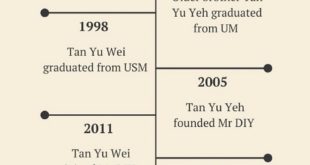[Article has been updated on 3 December 2020, 4:22pm]
For the past few years, Grab Holdings and Gojek have been locked in a long and expensive battle for dominance in the Southeast Asian region.
According to annual filings, Grab has been burning through cash and lost more than US$ 200 million in 2019.
To alleviate this problem, a merger between the two ride-hailing and food delivery giants has been in the works since last year.
According to The Straits Times yesterday (December 2), Grab and Gojek have made “significant progress” in working out the terms of the merger.
A structure with substantial support sees Anthony Tan becoming the CEO of the combined entity, while Gojek executives would run the business in Indonesia under the Gojek brand, reported The Straits Times.
The ultimate goal is to become a listed company, but the two brands may run separately for an extended period of time.
On Thursday (December 3), Grab told its employees in an internal note that “the firm is in a position to make acquisitions”.
“Our business momentum is good, and as with any market consolidation rumours, we are the ones in a position to acquire,” said Grab co-founder and CEO Anthony Tan.
Although some details have yet to be finalised, people with the knowledge of the talks have said that the two startups have managed to narrow some differences in opinions.
Both Grab and Gojek declined to comment.
The Biggest Internet Merger In Southeast Asia

Currently, Grab and Gojek are considered as some of the largest startups in Southeast Asia.
Grab is present in eight countries and was last valued at more than US$ 14 billion (S$ 18.75 billion), while Gojek has a presence in five countries and is valued at US$ 10 billion (S$ 13.38 billion).
Its potential merger is said to be the “biggest Internet merger in Southeast Asia”.
Investors have long been pushing for the two startups to combine forces across Southeast Asia. Currently, SoftBank Group’s Masayoshi Son, a major Grab investor, is also involved in the merger talks.
According to The Straits Times, SoftBank has been pushing for the deal since Masayoshi visited Indonesia this January.
What A Grab-Gojek Merger Will Look Like In Singapore

For a start, Singaporeans can potentially see more of Gojek’s features in Singapore.
Gojek currently only offers ride-hailing services in Singapore, but provides over two dozen features in its home country Indonesia.
Although Gojek has pulled the plug on several of its GoLife services, it has retained some features, including GoMassage (spa and massage) and GoClean (house cleaning) services.
In an interview with TODAY, Gojek’s general manager Lien Choong Luen commented that bringing these services to Singapore would always remain a “commercial decision” and that the firm will continue to evaluate such options.
Additionally, as Grab and Gojek will no longer have significant competition in the arena, they are unlikely to dish out promotional codes to attract new users to its platform, like it used to in the past.
It will therefore be important for the Singapore government to step in with its anti-monopoly laws to ensure that consumers and other businesses are protected from anti-competitive practices.
With these laws in place, it is possible that more ride-hailing players will enter the scene.
Currently, transport apps are already being rolled out quickly, with around half a dozen new ones in as little as a few weeks.
What’s In It For Consumers?

Many Singaporeans can probably remember the days when Grab and Uber had a price war in the country.
Back in 2016 — the days when Grab faced heavy competition from Uber — consumers were heavily rewarded with a slew of promotional codes from both ride-hailing companies.
Both companies utilised predatory pricing, where they set the costs of a service (i.e. rides) at a price lower than the marginal cost to the seller.
Through this, both companies were able to keep the costs of rides for passengers down, while upping the ante for low cost rides — all with the singular goal of eliminating the competition.
When Grab acquired Uber’s Southeast Asia business in March, both companies were slapped with combined fines of $ 9.5 million after the merger deal was found to have violated Singapore’s anti-competition laws.
The deal was declared as “anti-competitive” by the Competition Commission of Singapore after months of investigations into the merger.
Similarly, the Grab and Gojek is likely to lead to a monopolisation of the market, which will not benefit consumers.
Hence, while the merger is beneficial to cutting costs for both companies, it is important that the government ensures that regulations are in place to protect the interests of consumers.
Featured Image Credit: Kompas Tekno / SBR



